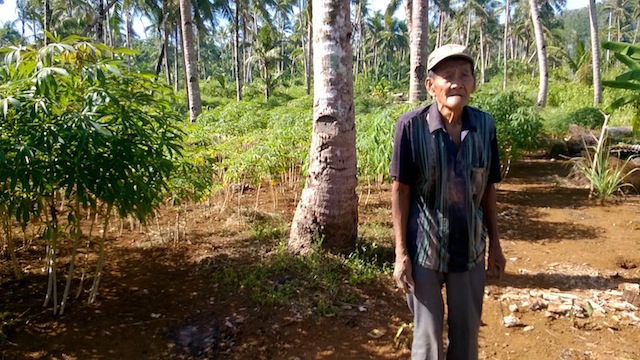Report by Lottie Salarda
EASTERN SAMAR–It’s been nearly years now since Super Typhoon Yolanda devastated parts of central Philippines. Farming was hit particularly hard by the disaster and is taking a heavy toll to poor farmers who do not have enough resources to rebuild their lives.
Felix Pelicano, 87 has been farming all his life. It is emotionally draining for him as after Yolanda destroyed most of his crops, he is worried about poor yields in his small patch of land because of blistering heat and lack of water for irrigation.
He can be seen under the scorching sun near their small thatched hut with his wife, Esperanza, 86 who told this reporter that they have been tilling their small land for so many decades now. They say they were able to send all their children to school solely from farming rootcrops like kamote and fruitbearing trees like mangoes; and sell their goods to the market.
On November 2013, Yolanda struck their community and killed 10 of their constituents. Brgy Asgad was located along the Pacific coast in the Eastern side of the Philippines.
Pelicano and his wife were rescued in their house as water begun to rise and submerged the whole community. Morethan 6,000 people were killed from Typhoon Yolanda. After the disaster, Pelican and his wife went back to plant rootcrops as farming is the only livelihood they know to earn a living.
“ That was the strongest typhoon that has ever hit our village. It destroyed my farm, our only livelihood. And now we are feeling the effects of the changing climate like extreme drought, sometimes it rain too. We are very worried as to where to get food for our family,” Pelicano lamented. “ With the situation we’re in now, without any harvest, there’s really nothing to do.”
Pelicano is one of millions of farmers in the developing countries, like the Philippines, who are now bearing the brunt of natural disasters coupled with the effects of climate change like droughts, flooding and erratic weather.
Last month at an international conference in Sendai, Japan, the Food and Agricultural Organization of the United Nations (FAO) released a report that stated that between 2003 and 2013, natural disasters in the developing countries such that of Typhoon Yolanda affected more than 1.9 billion people, and caused more than $494 billion in damages.
The FAO report analyzed 78 disasters in 48 developing countries, including the Philippines, adding that climate change exacerbates more extreme weather conditions and typhoon seasons. The report called for more support for farmers to avert the crisis.
As for Pelicano and his wife, they said they will never loose hope in farming amidst hardship that they face today.
Text and photos by Lottie Salarda
Latest posts by EnviroNewsph (see all)
- Global fund aimed at protecting nature and accelerate investment in conservation, launched in Canada - August 25, 2023
- Why ‘loss and damage’ is the most bitterly fought-over issue at COP27 climate talks? - November 18, 2022
- U.S. hands over P2.3M in equipment and wildALERT system to PH to protect wildlife - December 16, 2020


